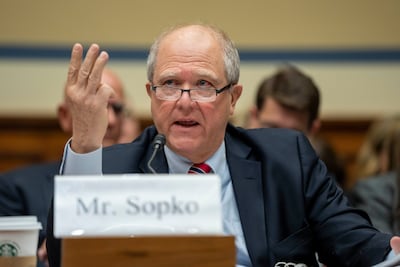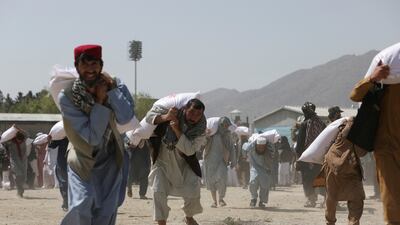The Taliban have diverted a “considerable amount” of American assistance to Afghanistan and policymakers must make tough choices when it comes to providing aid, a US watchdog told Congress on Tuesday.
John Sopko, the special inspector general for Afghanistan reconstruction, told the House foreign affairs committee that the Taliban “routinely” pressure US partners to hire their allies, award contracts to companies affiliated with them and dictate which Afghans should receive US aid.
“Those who control the guns control the aid,” Mr Sopko told the committee.
“Many would like to believe that we are aiding an Afghan people while successfully bypassing the Taliban.
"This can be viewed as a useful fiction, as it reassures, but ignores the fact that it is impossible to entirely bypass the Taliban regime.”
He said there are no “good choices for policymakers when providing humanitarian assistance in an environment like Afghanistan – only trade-offs".
Mr Sopko also said the Taliban demand payoffs from US partners before a project can begin, divert American food aid to Taliban soldiers, and tax recipients of aid when it is delivered.
A State Department official told The National that Washington and its partners “have policies and procedures to guard against, pre-empt, address and otherwise disrupt diversion of resources".
The official said that when the Taliban make “demands of partners beyond routine operational costs, partners pause or adjust operations accordingly".
The administration of President Joe Biden “remains committed to supporting the Afghan people and is providing assistance in Afghanistan through NGOs, international organisations, and other third parties, minimising benefit to the Taliban to the extent possible", the official said.
Known as Sigar, Mr Sopko's office was created by Congress to provide independent oversight of Afghanistan reconstruction projects.
It conducts audits and investigations aimed at preventing waste, fraud and abuse, as well as promoting effective reconstruction programmes.
The Republican-controlled House of Representatives has scrutinised the Biden administration's Afghanistan policy after its withdrawal from the country in 2021.
The committee's top Democrat, Gregory Meeks, said Republicans blocked State Department and US Agency for International Development witnesses from joining the hearing, and defended Mr Biden's management of engagement with the Taliban.
Committee chairman Mike McCaul claimed that administration officials “refused” to testify alongside Mr Sopko.
Mr Sopko described a culture of hostility between the State Department and Sigar.

He described “20 outstanding requests for information on ongoing audits.
"Thirteen of the outstanding requests for documents state should have been readily available," Mr Sopko said.
"Just give us reports, but they refused to give them to us.”
“We are not getting the internal documents we would normally get from the State Department."
The UN estimates 70 per cent of Afghans depend on donor-led humanitarian assistance. Washington remains the largest donor, with $400 million contributed so far this year.
In a written report, Mr Sopko raised concerns about the looming deportation of Afghans in Pakistan, after Islamabad began the first phase of a plan in which unregistered migrants are arrested and deported.
About 600,000 Afghans fled to Pakistan in the chaotic aftermath of the US withdrawal from its longest war, and more than one million Afghans already lived there.
“We believe many of the Afghans Sigar referred are currently at risk of deportation and being handed over to Taliban officials, who have issued arrest warrants for them, ransacked their homes and threatened their lives,” the report states.
As winter approaches, Sigar also issued warnings about a drop in international Afghanistan support.
The UN response plan “has raised only 34 per cent of its funding goal for 2023" and programmes “have had to decrease aid", the report notes.
“The World Food Programme, for example, was forced to stop supplying monthly food assistance to 10 million people this year.
"The situation will only worsen this winter as weather isolates rural areas from aid services.”


